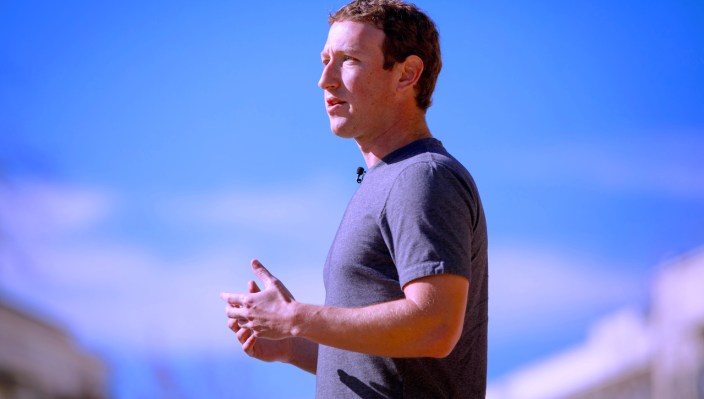Zuckerberg wants messages to auto-expire to make Facebook a "living room"
Companies, agencies, institutions, etc
Facebook
WhatsApp
Privacy-Focused Vision for Social
Private Interactions
FoundationFor
SafetyPeople
InteroperabilityPeople
RCS
Apple
Secure Data
People
Mark Zuckerberg
Facebook
Mike Isaac
’d
Groups
No matching tags
Physical locations
No matching tags
Places
No matching tags
Locations
Stories
New York
Instagram
Android-Zuckerberg
Russia
Events
Instagram-Facebook

Summary
With messaging, groups, and ephemeral stories as the fastest growing social features, Zuckerberg laid out why he’s rethinking Facebook as a private living room where people can be comfortable being themselves without fear of hackers, government spying, and embarrassment from old content — all without encryption allowing bad actors to hide their crimes.Perhaps this will just be more lip service in a time of PR crisis for Facebook. But now Zuckerberg has roadmapped a clearer slate of changes and policies to turn Facebook into a living room:-Facebook will let users opt in to the ability to send or receive messages across Facebook, WhatsApp, and Instagram-Facebook wants to expand that interoperability to SMS on Android-Zuckerberg wants to make ephemerality automatic on messaging threads, so chats disappear by default after a month or year, with users able to control that or put timers on individual messages.-Facebook plans to limit how long it retains metadata on messages once it’s no longer needed for spam or safety protections-Facebook will extend end-to-end encryption across its messaging apps but use metadata and other non-content signals to weed out criminals using privacy to hide their misdeeds.-Facebook won’t store data in countries with a bad track record of privacy abuse such as Russia, even if that means having to shut down or postpone operations in a countryYou can read the full blog post from Zuckerberg below:Posted by Mark Zuckerberg on Wednesday, March 6, 2019A Privacy-Focused Vision for Social NetworkingMy focus for the last couple of years has been understanding and addressing the biggest challenges facing Facebook. But now, with all the ways people also want to interact privately, there’s also an opportunity to build a simpler platform that’s focused on privacy first.I understand that many people don’t think Facebook can or would even want to build this kind of privacy-focused platform — because frankly we don’t currently have a strong reputation for building privacy protective services, and we’ve historically focused on tools for more open sharing. But we’ve repeatedly shown that we can evolve to build the services that people really want, including in private messaging and stories.I believe the future of communication will increasingly shift to private, encrypted services where people can be confident what they say to each other stays secure and their messages and content won’t stick around forever. This is the future I hope we will help bring about.We plan to build this the way we’ve developed WhatsApp: focus on the most fundamental and private use case — messaging — make it as secure as possible, and then build more ways for people to interact on top of that, including calls, video chats, groups, stories, businesses, payments, commerce, and ultimately a platform for many other kinds of private services.This privacy-focused platform will be built around several principles:Private interactions. If this evolution is successful, interacting with your friends and family across the Facebook network will become a fundamentally more private experience.Encryption and SafetyPeople expect their private communications to be secure and to only be seen by the people they’ve sent them to — not hackers, criminals, over-reaching governments, or even the people operating the services they’re using.There is a growing awareness that the more entities that have access to your data, the more vulnerabilities there are for someone to misuse it or for a cyber attack to expose it. And some people worry that our services could access their messages and use them for advertising or in other ways they don’t expect.End-to-end encryption is an important tool in developing a privacy-focused social network. However, today if you want to message people on Facebook you have to use Messenger, on Instagram you have to use Direct, and on WhatsApp you have to use WhatsApp. We want to give people a choice so they can reach their friends across these networks from whichever app they prefer.We plan to start by making it possible for you to send messages to your contacts using any of our services, and then to extend that interoperability to SMS too. With interoperability, you’d be able to use WhatsApp to receive messages sent to your Facebook account without sharing your phone number — and the buyer wouldn’t have to worry about whether you prefer to be messaged on one network or the other.You can imagine many simple experiences — a person discovers a business on Instagram and easily transitions to their preferred messaging app for secure payments and customer support; another person wants to catch up with a friend and can send them a message that goes to their preferred app without having to think about where that person prefers to be reached; or you simply post a story from your day across both Facebook and Instagram and can get all the replies from your friends in one place.You can already send and receive SMS texts through Messenger on Android today, and we’d like to extend this further in the future, perhaps including the new telecom RCS standard. We do not believe storing people’s data in some countries is a secure enough foundation to build such important internet infrastructure on.Of course, the best way to protect the most sensitive data is not to store it at all, which is why WhatsApp doesn’t store any encryption keys and we plan to do the same with our other services going forward.But storing data in more countries also establishes a precedent that emboldens other governments to seek greater access to their citizen’s data and therefore weakens privacy and security protections for people around the world.
As said here by Josh Constine